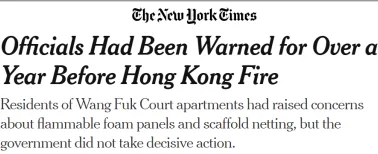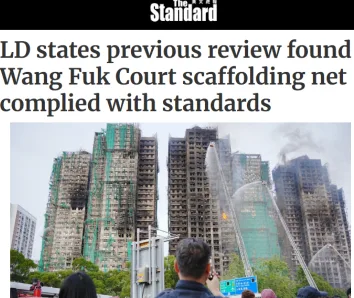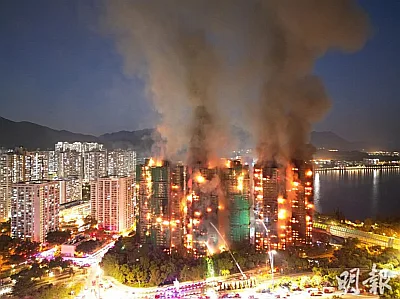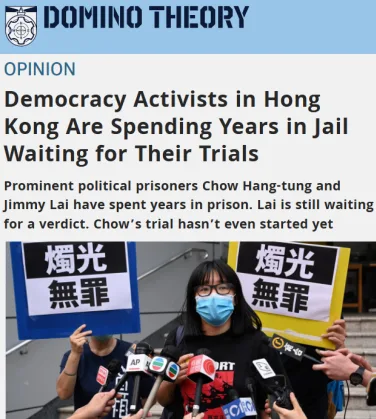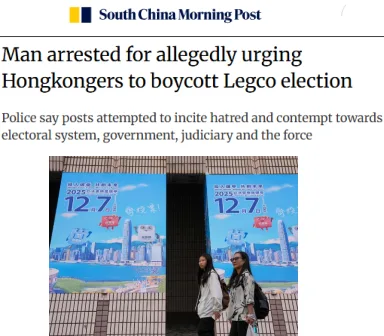No-one can accuse the Hong Kong government of being too touchy-feely. Following the worst disaster in living memory, the government by Friday faced grassroots volunteers distributing supplies, activist campaigners and a petition with a list of demands. It might have been a good time, after the constant post-2019 stress on national security and all-patriots public life, to tolerate and possibly embrace some resurgent civil society in order to win community trust. But nope. Someone wants to prioritize Mainland-style ‘stability maintenance’.
A Wen Wei Po editorial dated early Sunday complains…
Some individuals are attempting to exploit the anxiety and uncertainty felt by the victims and the general public, disseminating a large amount of smear campaigns and false information online to incite hatred and discontent against the government. Some are … making “four demands,” and some are even discussing and initiating demonstrations online. These are definitely malicious attempts to distort the post-disaster recovery efforts … All Hong Kong citizens should trust the SAR government’s arrangements to provide the victims with a quiet and safe environment so they can overcome this most difficult time … We … need to be vigilant against this risk to prevent a repeat of the black-clad violence and hijacking incidents of 2019. All Hong Kong citizens must resolutely see through and resist this trend and behavior that attempts to profit from others’ misfortunes and take the opportunity to ferment social discontent and hatred.
From HKFP…
Beijing’s national security office in Hong Kong has warned “anti-China disruptors” that they will face the “full force” of the security law for seeking to co-opt the deadly Tai Po fire to “incite resentment” against the government.
According to a statement issued by the Office for Safeguarding National Security (OSNS) on Saturday evening, “anti-China disruptors” and those with “ulterior motives” are still awaiting opportunities to cause chaos.
At a “critical moment” when the people and governments of Hong Kong and China are united in relief efforts, disruptors have “abandoned all humanity, disregarded facts, spread false information, maliciously attacked the SAR Government’s relief efforts, stirred up social division and confrontation, and incited resentment towards the Chief Executive and the SAR Government,” it warned.
An item in the SCMP’s rolling coverage (9.47pm Saturday) says…
A source has confirmed that a founder of a petition for the government to address four demands on follow-up work to the fire has been taken in by national security police.
The Post has learned that the man concerned is identified as “Miles” and is one of the people who launched the online petition.
“Miles” and a group of unnamed others set up the “Tai Po Fire Concern Group” and launched a petition calling for “four demands”. They include ongoing support for victims, setting up an independent commission of inquiry and pursuing accountability and holding government officials responsible.
(The previous headline is’ 79 Indonesians remain unaccounted for: consulate’.)
HKFP report on the arrest here.
Sky News video on grassroots volunteers being told to stop their work.
Although some local officials have a taste for accusing critics of ‘soft resistance’ or ‘inciting hatred’, they might have considered that there are still some big differences between Hong Kong and the Mainland. Hongkongers felt free to speak out or organize until just a few years ago, and those attitudes remain deeply ingrained. And Mainland authorities can eliminate all on-line mention of specific subjects just by entering keywords into a censorship system; in Hong Kong, social media will now be full of chatter about, say, the arrest of the petitioner. Like this.
Some international coverage from Friday/Saturday…
A thread from Bloomberg’s Matthew Brooker…
Digging up and reporting on local corruption scandals was a specialty of Apple Daily before it was shut down by Hong Kong authorities following China’s imposition of a national security law in 2020…
Who is left now to fulfil this civic duty, now that free media outlets have been tamed, intimidated and in some cases destroyed? The Legislative Council is entirely made up of pro-government loyalists now that opposition parties have been banished as unpatriotic.
This tragedy is inseparable from the change in the governance of Hong Kong from an open, transparent and pluralist system to one of unquestioning obedience to its Beijing masters, a secretive and autocratic culture in which corruption can flourish.
And another from exile Glacier Kwong Chung-ching on the problem of corruption and bid-rigging in renovation works…
Wang Fuk Court was in the middle of a HK$330M “mega-repair.” Residents had protested the sky-high cost, accusing the owners’ corporation of force-pushing the plan through despite objections. Transparency was minimal. Oversight was weak. This is exactly how bid-rigging works in HK housing estates: pre-selected contractors, inflated prices, limited competition, opaque decisions, and incentives to cut corners on materials and safety, because no one is genuinely checking, nor can the civil society did what it used to do– to hold different people to account and raise awareness of these issues.
From the NYT…
…the Labor Department confirmed that it had received complaints from residents about the construction netting. It said that it had conducted 16 inspections at Wang Fuk Court since July 2024, most recently a week before the fire. It found multiple violations and warned the contractor about unsafe working conditions on the site, the department said.
…Last month, when Chinachem Tower, a commercial building in central Hong Kong, caught fire, some Wang Fuk Court residents took their fears to a Facebook group. Firefighters had found netting and bamboo scaffolding at that building that looked similar to what was used at their complex.
“Everyone must be extra careful with fire during the winter,” one resident wrote.
“There are so many flammable items outside.”
…some residents fretted that the contractor was inflating costs while compromising on safety. They filed a complaint with the Labor Department in September 2024, two months after the scaffolding went up, according to the department and[Jason Poon Chuk-hung, a civil engineer-turned-activist].
…When the residents of Wang Fuk Court came to him, Mr. Poon eagerly took on their case.
He admonished officials at the Labor Department for misstating the fire risks at the construction site and pointed them to the applicable ordinances they had missed.
A Reuters story…
Residents of the housing complex that was engulfed in Hong Kong’s deadliest blaze in seven decades were told by authorities last year that they faced “relatively low fire risks” after complaining repeatedly about fire hazards posed by ongoing renovation works, the city’s Labour Department told Reuters.
Benedict Rogers in the Spectator…
While the immediate cause appears to be the flammable netting and polystyrene foam boards catching alight, a broader factor that appears to have contributed to this tragedy is the lack of transparency and accountability. So who should be held accountable, and how can accountability be ensured?
…this will be a test for Beijing and its proxy regime in Hong Kong. The regime has spent the past six years focused on implementing a crackdown on dissent, ripping up basic freedoms, human rights, the rule of law and autonomy promised in an international treaty, the Sino-British Joint Declaration, instead of investing in infrastructure and the welfare of local residents.
Disasters like these bring to the fore the tensions that simmer beneath the surface. If public anger cannot be expressed through free speech and peaceful protest – both now criminalised under Hong Kong’s repressive national security laws – in what ways might Hong Kongers seek accountability?

